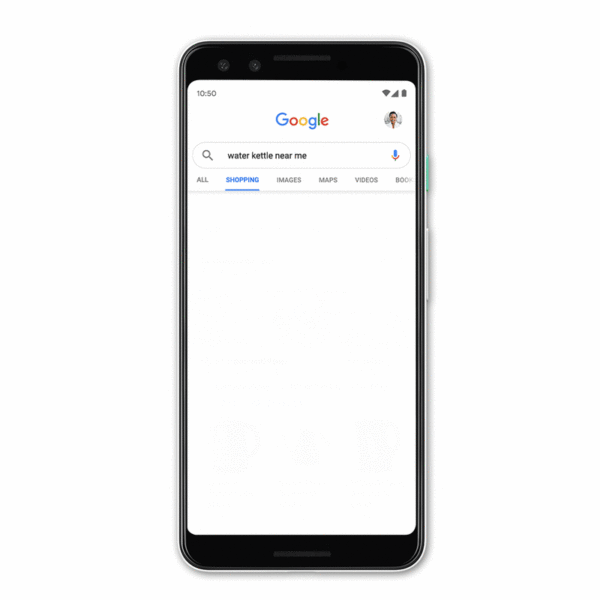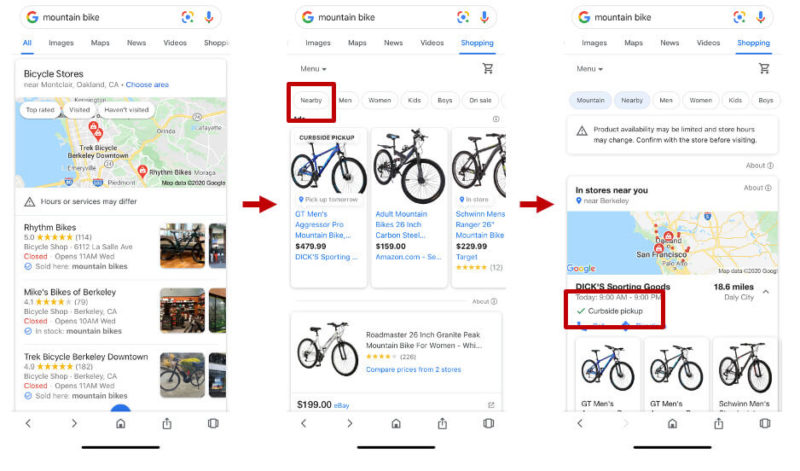Google boosting visibility of ‘nearby’ product inventory with new Shopping features
Responding to changing consumer behavior, Google starts emphasizing BOPIS
According to Adobe’s Digital Economy Index data, “buy online, pickup in store” (BOPIS) grew more than 250% year over year in August. The company also said that 30% percent of online buyers prefer BOPIS/curbside pickup over home delivery (read: traditional e-commerce).
Google has said something similar. The company reported Wednesday that searches for “curbside pickup” saw a “tenfold” increase in the past several months amid the pandemic.
Buy online, pick up locally. One of the reasons for this behavior is that consumers who would ordinarily visit stores are buying online to avoid potential exposure to the virus. But they’re also seeking the benefits of buying locally, which include the ability to take home the product the same day or return the product to a local retailer.
BOPIS promises to factor heavily into consumer shopping this holiday season. Accordingly, Google is taking a number of steps to make itself the place consumers search for products — online or offline. And local store inventory data is a competitive advantage in the company’s battle with Amazon.
Nearby Shopping filter with Local Stores Card

On Wednesday morning, Google announced that it’s making nearby product inventory more discoverable with some new and updated Shopping UI features:
- More prominent “nearby” filter under the Shopping tab.
- New local stores card.
- Greater visibility for Curbside and In-Store Pickup Labels.
The is a global rollout but only the local stores card is truly new. The other elements have just been made more visible to users.
[Read: Google positioned to dominate the ‘O2O economy’]
Nearby filter, local stores card. If users conduct a product search (e.g., “mountain bike”) they’ll see traditional search results, which may include local store information on the main SERP. However, if they click over to the Shopping tab they’ll typically see a “nearby” filter that will only display retailer locations with in-store inventory.
Shoppers don’t need to use “near me” or other local modifiers to trigger the nearby Shopping filter. But in cases where a modifier isn’t used, Google will only show the filter if it’s confident it has local inventory data (from merchant feeds).
Once the nearby filter is selected, users will see a new UI that Google is calling a “local stores card,” also constructed of local inventory data from merchant feeds. The card features a map at the top of the page and then local merchants (retail chains) with real-time product inventory (see image above).
[Read: In major shift, Google Shopping opens up to free product listings]
The local store information on the card indicates whether there’s curbside and in-store pickup or delivery, from GMB. Clicking on any individual product item leads to a product page hosted by Google. But clicking on the store name takes users to the relevant GMB local profile page.
Google is changing product search with local inventory

Why we care. These are modest changes but mirror dynamic and changing consumer behavior in the market. BOPIS is growing fast and it will continue to drive online sales that might otherwise have happened in stores during COVID-19. And retailers need to see this as a hybrid that’s neither pure e-commerce nor traditional retail but has elements of each.
Consumers are increasingly adopting this relatively new channel. For example, Target said that roughly 40% of its online orders are picked up in store and Best Buy cited an even larger percentage in recent earnings reports.
Google is also starting to reap the benefits of its local inventory feeds, which Amazon doesn’t have. Other than individual retail websites (and Bing), there’s no other place to go online to determine where a product might be carried locally, as well as compare multiple merchants in one place. This was the central ambition of a number of no-longer-existing startups over 10 years ago.
Google’s stepped-up effort to make local inventory more prominent in search means that merchant feeds are more important than ever. They enable Local Inventory Ads, the nearby filter and local stores cards discussed here, and the less-well-known “see what’s in store” feature of GMB profile pages. They will also help drive a lot of sales in Q4.
